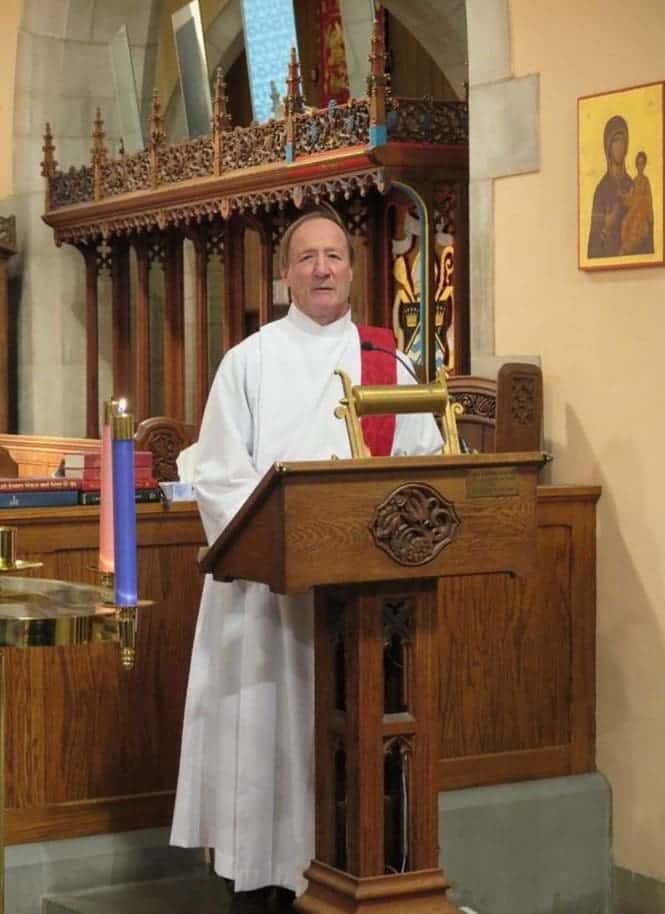Some time ago, we covered the Daniel Somers case in the Episcopal Diocese of New Jersey. In our coverage, we applauded the diocese for taking the complaints seriously, while noting the thoroughly un-Christian language in Somers’ responsive pleadings.
Subsequently, Anglican Watch learned that Chip Stokes, the outgoing bishop, had been aware for some time about concerns involving Somers. In true Episcopal fashion, he had kicked the can down the road and done his best to ignore things.
Why did Stokes finally decide to take things seriously? We’ll never know.
Perhaps it was the burgeoning likelihood of civil litigation. Or maybe the Church Pension Group didn’t want the responsibility for dealing with it if Stokes’ efforts to negotiate contracts for the parish blew up in their collective faces. Or maybe Stokes didn’t want to “pass the trash.”
Meanwhile, the parties have gotten into a tiff during discovery in the run-up to a full-fledged hearing. At issue is a report prepared by the diocesan investigator.
Comprising two parts, the first part of the report consists of the investigator’s findings. The second part is recommendatons for how to move forward with the matter.
Predictably, defense counsel wants access to the whole report, while the diocese wants to limit production to the factual findings.
Anglican Watch (AW) is pleased that the hearing panel got this one right, refusing to hand over the work-product developed in preparation for the hearing, aka the second part of the report.
So where does that leave us?
Overall, AW remains happy that the diocese is taking the matter seriously, including Somers’ purported tirade at his junior warden. It is important that this sort of conduct be addressed — indeed, there would be an official AW stretch limo to take our team to work if we had a dollar for every time we’ve documented (or experienced) verbal abuse by clergy.
Abuse is abuse, full stop. It doesn’t matter whether it’s verbal, physical, emotional, financial, spiritual, sexual or any other sub-category, and we get tired of the no-blood, no-foul approach of many judicatories.
Yes, we might overlook one incident of yelling at a parishioner, with a really good excuse (like my spouse died yesterday) and a really good apology (like flowers and dinner at the Inn at Little Washington), but beyond that, clergy need to get a grip.
This behavior isn’t acceptable in corporate America, so why on earth is it okay for clergy? What about the higher standard the canons say applies to clergy?
At the same time, the matter got to this point, we believe, because Somers had been allowed to get away with so much for so long. A far better approach would have been to tell Somers early in the game, “One more issue and you’re toast.” Far too few bishops are willing to go there, but this is a conversation that needs to happen, for everyone’s sake.
We also note that there have been enough issues with Somers that we have to question how this chucklehead ever made it through postulancy in the first place. As near as we can tell, he is argumentative, mean-spirited, ill-tempered, controlling, and nasty. And while we have never met her, we are glad that Julia Barringer, Jr., then junior warden of the church, apparently told this jackrabbit off.
And even with a swarm of lawyers involved (or maybe because they’re involved), we note with some concern that the Somers reference panel may not fully understand its role — emphasis on maybe.
Specifically, in the investigatory report, the Diocese says:
A Reference Panel was then held on November 18, 2021, and the panel concluded that there was sufficient evidence of violations of Canon IV.4.1(h)(6) (conduct involving dishonesty, fraud, deceit or misrepresentation) and IV.4.1(h)(9) for the matter to proceed forward.
That’s worrisome, as the reference panel makes no findings of fact and does not assess the credibility of witnesses. All it does is assess the investigator’s report and develop referral options. Specifically:
It is not the role of the Reference Panel or the Investigator to evaluate or comment on the perceived truthfulness or credibility of the parties or witnesses interviewed, but to refer or dismiss the matter assuming the information received is true.
To be clear, the findings of the investigator’s report may inform the Reference Panel’s decisions. It’s also true that many judicatories play fast and loose with Title IV. For example, Todd Ousley bloviates on the Title IV website about a pastoral response yet sees no need actually to provide one. So it’s important not to get hung up on the specifics of this case, and any blurring of roles certainly has not prejudiced the respondent.
At the highest level, though, we’re seeing one of the great challenges with Title IV, which is that it lurches along interminably, even when there is no dispute over the facts or canons. For example, it is indisputable that:
- Somers sued the diocese and his bishop in violation of the canons.
- Acted improperly toward his junior warden.
- Failed to retire when he turned 72 as required by canon.
Thus, our hope is that Title IV will eventually include a fast-track provision, with safeguards, for uncontested violations of the canons. And, as always, we would like to see an alternative path forward in cases in which a corrupt bishop sandbags complaints in violation of the canons.
Meanwhile, we hope Somers will do all involved a favor and make himself scarce, and do so post haste.
Photo courtesy NJ.com


Leave a Reply